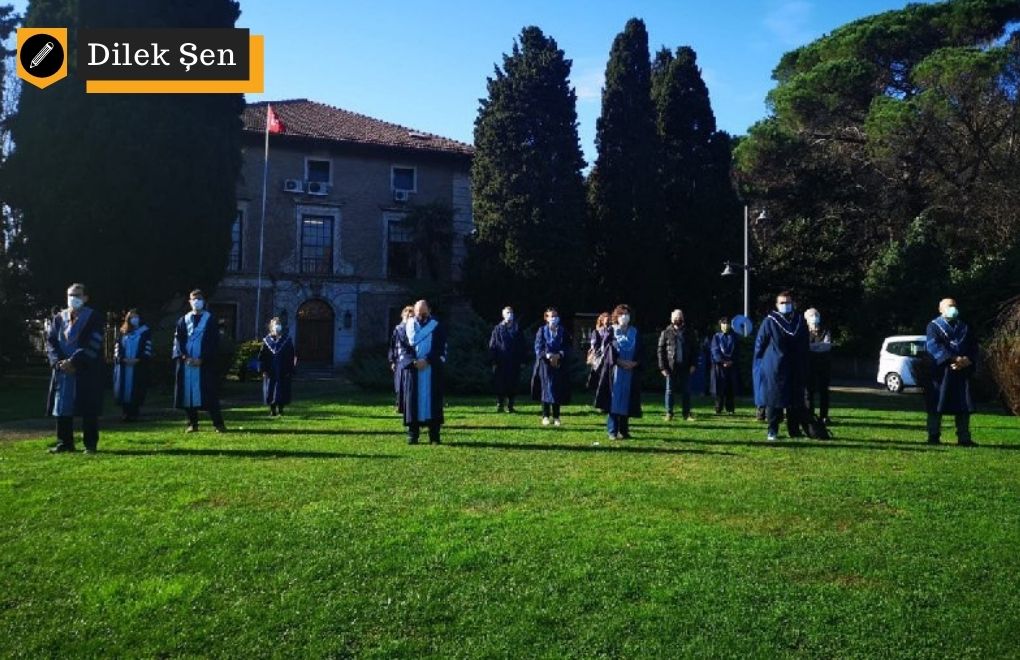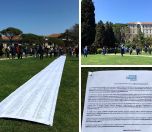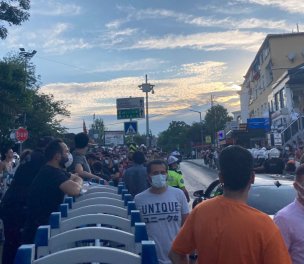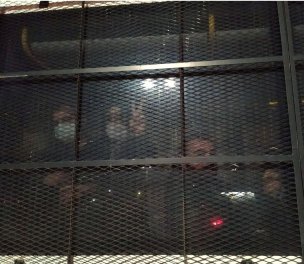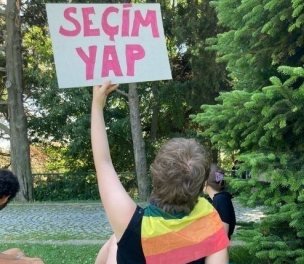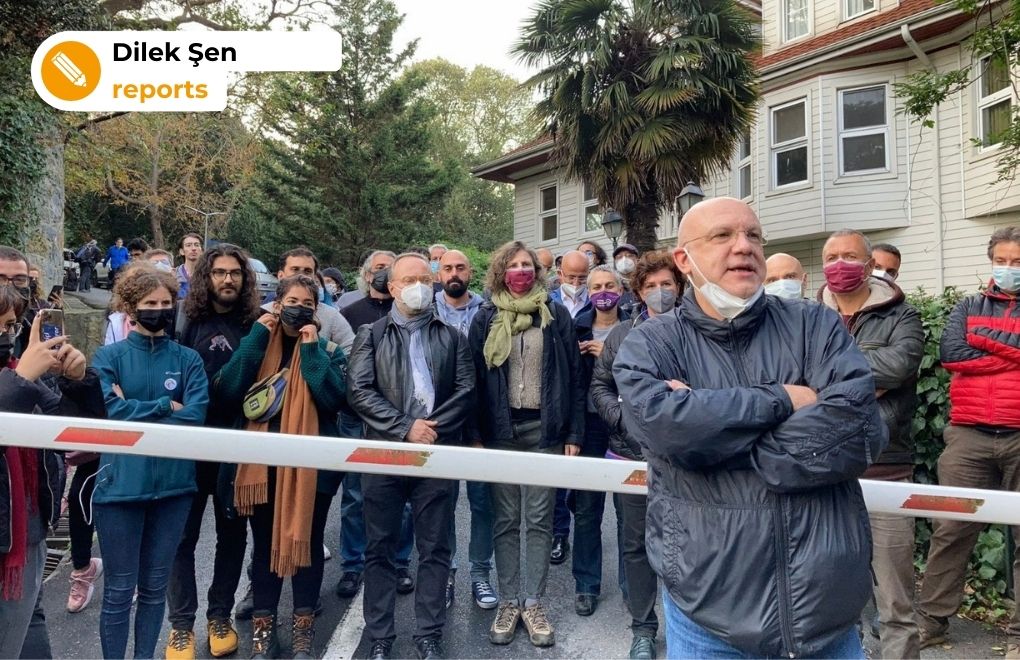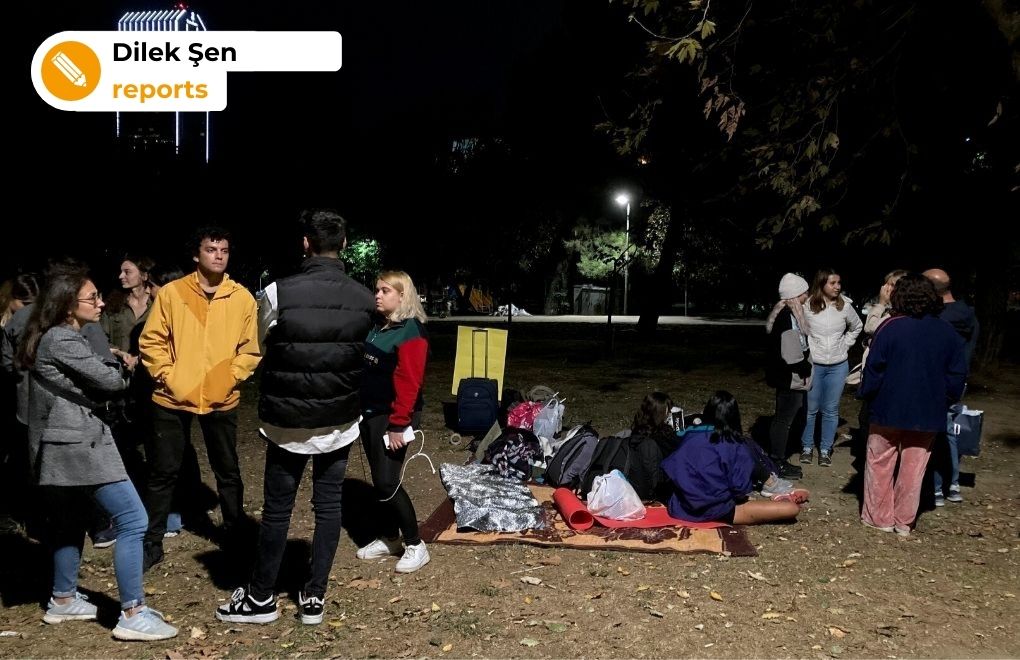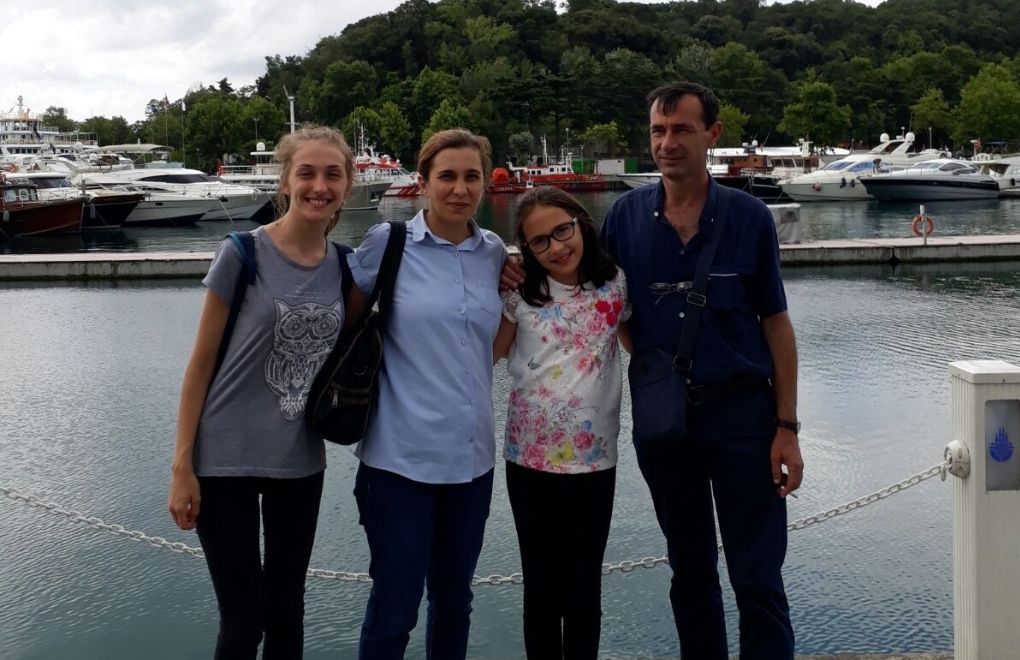Academic turning their backs to the rector's office in protest of Prof. Bulu. (Photo: Boğaziçi Solidarity)
Click to read the article in Turkish
Being the rector of Boğaziçi University was a dream that I had been thinking about for a very long time. I guess it was 22 years ago, I expressed this to Ali Kırca at Siyaset Meydanı [TV program]. With its constituents, alumni, students, professors and even with the shopkeepers around, we will bring Boğaziçi University to a much better point.
This is what Prof. Melih Bulu told reporters on February 3, about one month after his appointment as the rector of Boğaziçi University. He also reiterated that he wanted Boğaziçi to become a top 100 university in the world.
However, Bulu never worked at Boğaziçi University except for a period when he was a visiting professor. His appointment has been criticized from the beginning.
The criteria
In order to be the rector of Boğaziçi University, one should have higher qualifications than the criteria determined by the Council of Higher Education (YÖK).
In order to be a professor of business administration at Boğaziçi University, an academic should have at least five publications after the start of the proceedings for their appointment as an associate professor, according to Boğaziçi University Senate decision no. 2019-01 dated January 16, 2019. Among these publications, at least two should be in journals indexed in SSCI or one should be indexed in SSCI and one in SCI/SCIE.
Bulu doesn't meet these requirements. Also, as he did not work for a public university as a permanent member before, he is not a public servant, which is a requirement for being the rector of a public university.
Recently, İstanbul Medeniyet University has made an announcement for a professor position, for which Bulu meets the requirements.
We have spoken with Prof. Cevza Sevgen, who had been a member of the Boğaziçi University Senate for 13 years.
What are the requirements for being an academic staff member at Boğaziçi University?
About 15 years ago, a Senate decision that 'We should determine our criteria and reevaluate, upgrade them at intervals' was made at Boğaziçi University. As I had been at the Senate for 13 years, I have considerable knowledge about this issue.
You know, there are standards that the state set for promotions and staff appointments. However, as those criteria were not sufficient for us, every department determined their own minimum requirements for assistant professor, associate professor and professor position applications. This took more than a year.
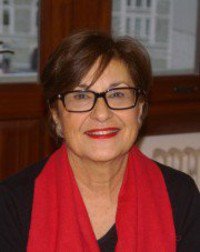
So fine details... For example, there is the issue of which reputable publishing houses will publish books if a book is to be published. If [a publication] will be published in a journal, you need to have publications in SCI, SSCI, AHCI indexed journals. Because there are so many cheesy journals in which you can publish an article by paying for it. These journals need to be filtered.
The criteria set by the Council of Higher Education and the Interuniversity Council don't exactly match our criteria. Those are the minimum criteria, every university can legally determine a minimum standard higher than those. By the way, I'd like to state that it is possible to find the requirements of every department for position applications on Boğaziçi University's website. So, we are a transparent university in this regard.
Does Melih Bulu meet the criteria?
It was searched and no indexed publications of him were found. For professorship, the publication of an article in an indexed journal is not enough, it also needs to be cited. Indexed publications and the number of citations are checked for an appointment of a professor at Boğaziçi.
What does "forgetting to put an excerpt in quotation marks" mean?
I received my doctorate in the 1970s. Repeating someone's word without quotation marks was considered plagiarism back then. It had been considered plagiarism before that and it is considered plagiarism after that. Knowingly or not, —I don't know how it was, to be honest— quotes without quotation marks have always been considered plagiarism. TUBA's [Academy of Sciences of Turkey] Science Ethics Handbook describes in detail the issue of getting something in quotes.
Bulu is not a public servant. Is this a problem that can be solved?
The method of assignment can be used for Melih Bulu. A position is found at a public university and he can be assigned to our university as soon as he gets that position. The position problem can be solved this way but many would consider this a cheat.
How long will you reject this assignment? Have you ever witnessed such a protest in the South Campus?
We don't think about giving up. We'll get a result or not, but we'll make a notch in public memory. I have been an academic for 40 years, I don't remember the rector confronting academics and professors in such a way, I don't remember the school being surrounded by police. This means that such incidents against our academic culture did not happen before.
What happened?Prof. Melih Bulu was appointed as the President of Boğaziçi University in a Presidential Decree published in the Official Gazette on January 1, 2021. The appointment of Bulu sparked harsh criticisms among both the students and academics of the university as well as in the academic community. Appointed to Boğaziçi, one of the most prestigious universities in Turkey, from outside its community, Bulu was a candidate for nomination to run in the Parliamentary elections in 2015 for the ruling Justice and Development Party (AKP), which is chaired by President Recep Tayyip Erdoğan. The students and several students' clubs of the university campaigned on social media under the hashtag #kayyımrektöristemiyoruz (We don't want a trustee-rector). The call of the students was also supported by the faculty members of the university, who released a joint statement on January 3. "An academic outside Bogazici University community was appointed as rector (university president), which is a practice introduced for the first time after the 1980s military tutelage," read their statement. Amid harsh criticisms of students and faculty members, Prof. Bulu shared a message on his Twitter account, welcoming his appointment to the position, saying, "We are all in the same boat." The students protested the appointment of Bulu in front of the South Campus of the university in İstanbul on January 4. However, the police intervened into the protest with pepper gas and plastic bullets. Next day, it was reported that there were detention warrants against 28 people for "violating the law on meetings and demonstrations" and "resisting the officer on duty." Later in the day, 22 of them were detained. 40 people in total were detained over the protests. All of the detained were released on January 7 and 8, 2021. The protests of students and faculty members at the South Campus of Boğaziçi University have been going on since January 4. Taken into custody over a picture of the Kaaba, a sacred site in Islam, with a Shahmaran figure and four LGBTI+ flags on its corners, two students were arrested and two were placed under house arrest over this picture displayed at an exhibition as part of the protests at the South Campus. On February 1, police stormed the South Campus and intervened into the students' protests. Earlier in the day, the students gathered in front of the campus for the protest. Police hindered the protest while also preventing the students inside the South Campus from joining their friends outside. With the 51 students taken into custody inside the campus in the evening, the number of detained increased to 159. In a statement released by the İstanbul Governor's Office in the early morning hours on February 2, it was announced that 98 students were released from detention. On February 2, Boğaziçi University students gathered in Kadıköy Rıhtım for another protest, which was attacked by the police with plastic bullets and tear gas. 134 people were taken into custody by the police. Two of the protesters were arrested by the court afterwards. On February 6, four more people were arrested and two others were placed under house arrest over their participation in Boğaziçi protests in Kadıköy. On the same day, Erdoğan issued a Presidential decree to open two new faculties at the university. In response to this, the Boğaziçi Solidarity platform addressed an open letter to the "12th President of Turkey." A day later, student Beyza Buldağ was taken into custody for allegedly administering the "Boğaziçi Solidarity" Twitter account and arrested for "provoking the public to hatred, enmity and hostility" and "provoking to commit crimes" over both the letter and other Twitter posts. As of February 7, the Boğaziçi Solidarity platform announced that at least 560 students were detained, 25 were sentenced to house arrest and 10 were arrested. Students have been arrested on charges of "degrading or provoking the public to hatred and hostility" and "resisting to prevent fulfilment of duty" as per the Articles 216 and 265 of the Turkish Penal Code (TCK). CLICK - Why are 11 university students arrested? On February 10, one more student was arrested. With the release of Beyza Buldağ and Muhammed Önal on February 12, there remained nine students arrested over Boğaziçi University protests against the appointed rector. On February 22, two more students were placed under house arrest on the grounds that they distributed the letter of an arrested student to citizens. About Melih BuluProf. Melih Bulu was appointed as the President of Haliç University on January 17, 2020. In office in this foundation university for less than a year, he has been appointed as the President of Boğaziçi University. He was a Dean and University President at the İstinye University from 2016 to 2019. Between the years of 2010 and 2016, he was the Head of the Business Management Department of İstanbul Şehir University's Business Management and Management Science Faculty. He was the General Coordinator of International Competitiveness Research Institute (URAK), an NGO working on economic competitiveness of cities and countries, from the year 2017 to 2019. Since 2011, he has been the Executive Board member of the İstanbul Electric-Electronic Machinery and Informatics Exporters R&D Market. In 2002, he founded the Sarıyer District Organization of the ruling AKP in İstanbul. In 2015, he was a candidate for nomination to run in the Parliamentary elections from the AKP in the first election district in İstanbul. He studied Industrial Engineering at the Middle East Technical University (METU) in Ankara in 1992. He did his MBA and PhD at Boğaziçi University's Department of Management. |
(DŞ/VK)





